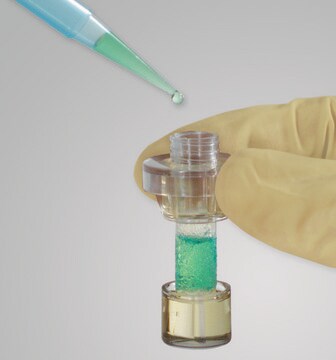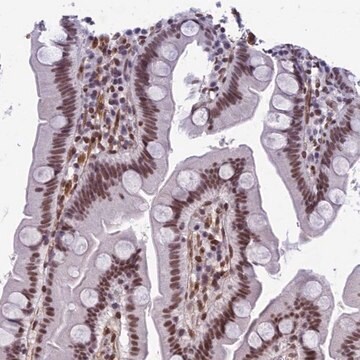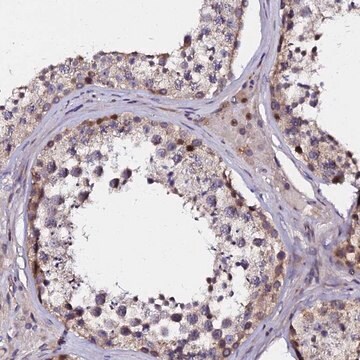SCP0186
Metastin, KISS-1 68-121
≥95% (HPLC)
Anmeldenzur Ansicht organisationsspezifischer und vertraglich vereinbarter Preise
Alle Fotos(1)
About This Item
Empirische Formel (Hill-System):
C258H401N79O78
Molekulargewicht:
5857.43
UNSPSC-Code:
12352200
NACRES:
NA.32
Empfohlene Produkte
Assay
≥95% (HPLC)
Form
lyophilized
Zusammensetzung
Peptide Content, ≥75%
Lagerbedingungen
protect from light
Lagertemp.
−20°C
Amino Acid Sequence
Gly-Thr-Ser-Leu-Ser-Pro-Pro-Pro-Glu-Ser-Ser-Gly-Ser-Arg-Gln-Gln-Pro-Gly-Leu-Ser-Ala-Pro-His-Ser-Arg-Gln-Ile-Pro-Ala-Pro-Gln-Gly-Ala-Val-Leu-Val-Gln-Arg-Glu-Lys-Asp-Leu-Pro-Asn-Tyr-Asn-Trp-Asn-Ser-Phe-Gly-Leu-Arg-Phe-NH2
Anwendung
Kisspeptins are a family of peptides encoded by the KISS-1 gene that are involved in GPR54 mediated cell signaling. Kiss-1 gene products are involved in metastasis suppression and the regulation of gonadotropin-releasing hormone (GnRH) secretion. A variety of kisspeptin peptides are available for use to study their unique functions.
Lagerklassenschlüssel
11 - Combustible Solids
WGK
WGK 3
Flammpunkt (°F)
Not applicable
Flammpunkt (°C)
Not applicable
Hier finden Sie alle aktuellen Versionen:
Analysenzertifikate (COA)
Lot/Batch Number
Die passende Version wird nicht angezeigt?
Wenn Sie eine bestimmte Version benötigen, können Sie anhand der Lot- oder Chargennummer nach einem spezifischen Zertifikat suchen.
Besitzen Sie dieses Produkt bereits?
In der Dokumentenbibliothek finden Sie die Dokumentation zu den Produkten, die Sie kürzlich erworben haben.
E Papaoiconomou et al.
In vivo (Athens, Greece), 25(3), 343-354 (2011-05-18)
The Kiss-1 gene encodes a secreted protein that is proteolytically cleaved to produce a number of structurally related peptides, with high interspecies conservation, globally termed kisspeptins. The original niche for the role of kisspeptin in human physiology is derived from
Rafael Pineda et al.
Progress in brain research, 181, 55-77 (2010-05-19)
Reproductive maturation and function are maintained by a complex neurohormonal network that integrates at the so-called hypothalamic-pituitary-gonadal (HPG) axis. This system is hierarchically controlled by the decapeptide, GnRH, which in turn is under the dynamic regulation of multiple stimulatory and
Jenny Clarkson et al.
The Journal of neuroscience : the official journal of the Society for Neuroscience, 28(35), 8691-8697 (2008-08-30)
Kisspeptin and its receptor GPR54 have recently been identified as key signaling partners in the neural control of fertility in animal models and humans. The gonadotropin-releasing hormone (GnRH) neurons represent the final output neurons of the neural network controlling fertility
Naresh Kumar Hanchate et al.
The Journal of neuroscience : the official journal of the Society for Neuroscience, 32(3), 932-945 (2012-01-21)
Reproduction is controlled in the brain by a neural network that drives the secretion of gonadotropin-releasing hormone (GnRH). Various permissive homeostatic signals must be integrated to achieve ovulation in mammals. However, the neural events controlling the timely activation of GnRH
Unser Team von Wissenschaftlern verfügt über Erfahrung in allen Forschungsbereichen einschließlich Life Science, Materialwissenschaften, chemischer Synthese, Chromatographie, Analytik und vielen mehr..
Setzen Sie sich mit dem technischen Dienst in Verbindung.








